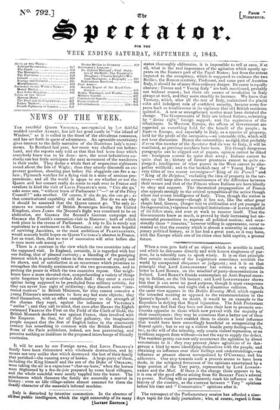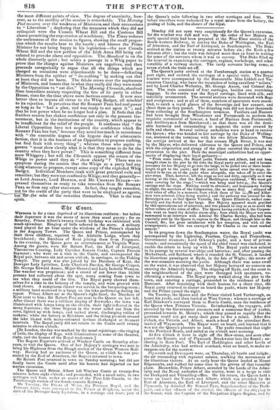The retrospect of the Parliamentary session has afforded a nine-
days topic for the daily journalists ; who, of course, regard it from The retrospect of the Parliamentary session has afforded a nine- days topic for the daily journalists ; who, of course, regard it from the most different points of view. The degree of unanimity, how- ever, as to the sterility of the session is remarkable. The Morning Post mourns over the weakness of Ministers, and their concessions to " Liberalism " • deploring that the measures which they did not relinquish were ;ha Canada Wheat Bill and the Customs Bill clause permitt ing t he exportation of machinery. The Times reduces the uselessness of the session to figures, showing the small propor- tion which the results bear to the bustle ; and blames the Prime Minister for not being happy in his legislation—the new Canada Wheat Bill and the new portion of the Irish Arms Bill being cal- culated to provoke alarm and opposition. The Standard is on the whole discreetly quiet ; but seizes a passage in a Whig paper to prove that the charges against Ministers are negatives, and then proceeds categorically to argue that all the things which are charged as omissions were objectionable to be done—defending Ministers from the epithet of " do-nothing " by making out that at least they did no harm. The Globe crows over the supineness of Ministers, and boasts that in what they really did they were made by the Opposition to "eat dirt." The Morning Chronicle, absolved from immediate anxiety respecting the fate of its party in either House, rises for the time above mere factious contest. It now sees better than to impute all virtue to the Whig Budget, all mischief to its rejection. It perceives that Sir ROBERT PEEL had real power so long as he "had a plan, and was ready to act upon it " ; and that he lost power when he no longer had a plan. It finds that the fruitless session has shaken confidence not only in the present Go- vernment, but in the institutions of the country, which appear to be insufficient for the relief of the people. It confesses that "the Liberal Opposition have not acquired the confidence which Sir ROBERT PEEL has lost," because they acted too much in accordance with "the execrable dogma of the bygone days of aristocratic faction, that it is the business of an Opposition to propose nothing, but find fault with every thing " ; whereas those who aspire to govern "must show clearly what it is that they mean to do for the country when they have power:" This is something different from mere Whiggery ; but will the Chronicle oppose the return of the Whigs to power until they do "show clearly" ? There was no symptom during the session that the Whigs as a party had any thing whatever to propose, except some copy of the exploded Whig Budget. Individual Members dealt with great practical evils and remedies; but they were not confined to Whigs; and they generally— as Lord ASHLEY, Lord Howlett, and Mr. CHARLES BULLER—ex- pressed themselves as ready to take remedies from Sir ROBERT PEEL as from any other statesman. In fact, they sought remedies, not for the credit of the party that were to be employed as agents,
o he sake of the remedies themselves. That is the true spirit.



























 Previous page
Previous page